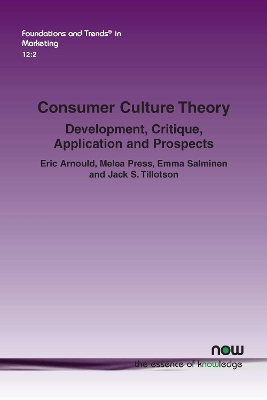Foundations and Trends (R) in Marketing
1 total work
Consumer Culture Theory
by Eric Arnould, Melea Press, Emma Salminen, and Jack S. Tillotson
Published 24 April 2019
Consumer Culture Theory: Development, Critique, Application and Prospects is a guide to help readers find their way through existing Consumer Culture Theory (CCT) literature, the most current conceptual and methodological developments, managerial implications, and potential avenues of future importance.
First, the authors elaborate on the nature of Consumer Culture Theory. Second, they address different approaches in CCT, including the humanistic/romantic, the social constructivist, and the postmodern modes of inquiry. Third, the monograph examines domains of inquiry in CCT, identifying significant streams including identity work, marketplace cultures, the socio-historic patterning of consumption, an ideological turn, and critiques of CCT. Fourth, it identifies some methodological issues and innovations that CCT work has addressed, including issues of data collection, interpretation, around validity and verification. The authors also evoke work on alternative modes of representing research. Fifth, this monograph introduces how CCT research has addressed managerial and strategic issues, such as through brand communities, branding, and how consumers shape market systems. Finally, it discusses tendencies that are emerging in CCT.
First, the authors elaborate on the nature of Consumer Culture Theory. Second, they address different approaches in CCT, including the humanistic/romantic, the social constructivist, and the postmodern modes of inquiry. Third, the monograph examines domains of inquiry in CCT, identifying significant streams including identity work, marketplace cultures, the socio-historic patterning of consumption, an ideological turn, and critiques of CCT. Fourth, it identifies some methodological issues and innovations that CCT work has addressed, including issues of data collection, interpretation, around validity and verification. The authors also evoke work on alternative modes of representing research. Fifth, this monograph introduces how CCT research has addressed managerial and strategic issues, such as through brand communities, branding, and how consumers shape market systems. Finally, it discusses tendencies that are emerging in CCT.
